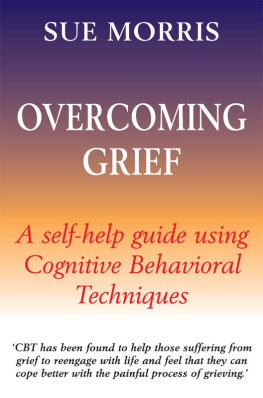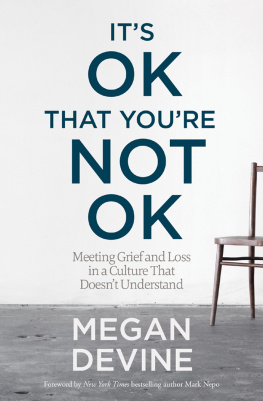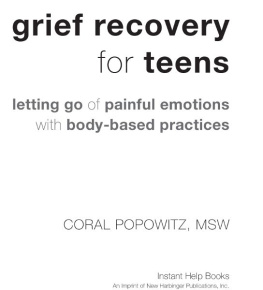SUE MORRIS is a Clinical Psychologist trained in CBT and who specialises in bereavement. Originally from Sydney, Australia, Sue is the Director of Bereavement Services at the Dana-Farber Cancer Institute in Boston, USA. Sue has worked in Australia, Hong Kong and the USA in a variety of settings including community mental health agencies, hospice and private practice.
The aim of the Overcoming series is to enable people with a range of common problems and disorders to take control of their own recovery program. Each title, with its specially tailored program, is devised by a practising clinician using the latest techniques of cognitive behavioral therapy techniques which have been shown to be highly effective in changing the way patients think about themselves and their problems.
The series was initiated in 1993 by Peter Cooper, Professor of Psychology at Reading University and Research Fellow at the University of Cambridge in the UK whose original volume on overcoming bulimia nervosa and binge-eating continues to help many people in the USA, the UK and Europe. Many books in the Overcoming series are recommended by the UK Department of Health under the Books on Prescription scheme.
Other titles in the series include:
OVERCOMING ANGER AND IRRITABILITY
OVERCOMING ANOREXIA NERVOSA
OVERCOMING ANXIETY
BULIMIA NERVOSA AND BINGE-EATING
OVERCOMING CHILDHOOD TRAUMA
OVERCOMING CHRONIC FATIGUE
OVERCOMING CHRONIC PAIN
OVERCOMING COMPULSIVE GAMBLING
OVERCOMING DEPERSONALIZATON AND FEELINGS OF UNREALITY
OVERCOMING DEPRESSION
OVERCOMING INSOMNIA AND SLEEP PROBLEMS
OVERCOMING LOW SELF-ESTEEM
OVERCOMING MOOD SWINGS
OVERCOMING OBSESSIVE COMPULSIVE DISORDER
OVERCOMING PANIC
OVERCOMING PARANOID AND SUSPICIOUS THOUGHTS
OVERCOMING PROBLEM DRINKING
OVERCOMING RELATIONSHIP PROBLEMS
OVERCOMING SEXUAL PROBLEMS
OVERCOMING SOCIAL ANXIETY AND SHYNESS
OVERCOMING TRAUMATIC STRESS
OVERCOMING WEIGHT PROBLEMS
OVERCOMING WORRY
OVERCOMING YOUR CHILDS FEARS AND WORRIES
OVERCOMING YOUR CHILDS SHYNESS AND SOCIAL ANXIETY
OVERCOMING YOUR SMOKING HABIT
All titles in the series are available by mail order.
Please see the order form at the back of this book.
www.overcoming.co.uk
OVERCOMING
GRIEF
A self-help guide using Cognitive Behavioral Techniques
SUE MORRIS
ROBINSON
London
Constable & Robinson Ltd
5556 Russell Square
London WC1B 4HP
www.constablerobinson.com
First published in the UK by Robinson,
an imprint of Constable & Robinson Ltd 2008
Copyright Sue Morris
The right of Sue Morris to be identified as the authors of this work has been asserted by her in accordance with the Copyright, Designs and Patents Act, 1988.
All rights reserved. This book is sold subject to the condition that it shall not, by way of trade or otherwise, be lent, re-sold, hired out or otherwise circulated in any form of binding or cover other than that in which it is published and without a similar condition including this condition being imposed on the subsequent purchaser.
A copy of the British Library Cataloguing in
Publication Data is available from the British Library.
Important Note
This book is not intended as a substitute for medical advice or treatment.
Any person with a condition requiring medical attention should consult a qualified medical practitioner or suitable therapist.
ISBN 978-1-84529-677-3
eISBN 978-1-47210-575-2
Printed and bound in the EU
1 3 5 7 9 10 8 6 4 2
Table of contents
Chapter 8 The firsts
Acknowledgements
I would like to thank the many people clients, friends and relatives in the USA, UK and Australia who told me their stories about how the deaths of their loved ones had impacted on their lives. I would also like to thank my colleagues at Old Colony Hospice in Boston, USA, where I learnt so much more about death and dying and the need for a more open discussion about end of life issues. I am also very grateful to my friend and Australian colleague Jo Lamble, who graciously offered to read the manuscript in its final stages. Also, I would like to thank the staff at Constable & Robinson, especially Fritha Saunders for her guidance along the way, and Emma Copeland for editing the manuscript. Finally, a big thank you to my family and friends for their ongoing encouragement especially David for his unfailing belief that I could do this, to our daughters who tolerated my long computer absences, and to my mother and father who taught me first hand about life and death.
Sue Morris
Introduction
Why a cognitive behavioral approach?
The approach this book takes in attempting to help you overcome your problems with grief is a cognitive behavioral one. A brief account of the history of this form of intervention might be useful and encouraging. In the 1950s and 1960s a set of therapeutic techniques was developed, collectively termed behavior therapy. These techniques shared two basic features. First, they aimed to remove symptoms (such as anxiety) by dealing with those symptoms themselves, rather than their deep-seated underlying historical causes (traditionally the focus of psychoanalysis, the approach developed by Sigmund Freud and his associates). Second, they were scientifically based, in the sense that they used techniques derived from what laboratory psychologists were finding out about the mechanisms of learning, and they put these techniques to scientific test. The area where behavior therapy initially proved to be of most value was in the treatment of anxiety disorders, especially specific phobias (such as extreme fear of animals or heights) and agoraphobia, both notoriously difficult to treat using conventional psychotherapies.
After an initial flush of enthusiasm, discontent with behavior therapy grew. There were a number of reasons for this. An important concern was the fact that behavior therapy did not deal with the internal thoughts which were so obviously central to the distress that many patients were experiencing. In particular, behavior therapy proved inadequate when it came to the treatment of depression. In the late 1960s and early 1970s a treatment for depression was developed called cognitive therapy. The pioneer in this enterprise was an American psychiatrist, Professor Aaron T. Beck. He developed a theory of depression which emphasized the importance of peoples depressed styles of thinking, and, on the basis of this theory, he specified a new form of therapy. It would not be an exaggeration to say that Becks work has changed the nature of psychotherapy, not just for depression but for a range of psychological problems.
The techniques introduced by Beck have been merged with the techniques developed earlier by the behavior therapists to produce a therapeutic approach which has come to be known as cognitive behavioral therapy (or CBT). This therapy has been subjected to the strictest scientific testing and has been found to be highly successful for a significant proportion of cases of depression. It has now become clear that specific patterns of disturbed thinking are associated with a wide range of psychological problems, not just depression, and that the treatments which deal with these are highly effective. So, effective cognitive behavioral treatments have been developed for a range of anxiety disorders, such as panic disorder, generalized anxiety disorder, specific phobias, social phobia, obsessive compulsive disorders, and hypochondriasis (health anxiety), as well as for other conditions such as drug addictions and eating disorders like bulimia nervosa. Indeed, cognitive behavioral techniques have been found to have an application beyond the narrow categories of psychological disorders. They have been applied effectively, for example, to helping people with low self-esteem, those with weight problems, couples with marital difficulties, as well as those who wish to give up smoking or deal with drinking problems. In this self-help manual these principles are applied to people who are having problems overcoming their feelings of grief.
Next page








